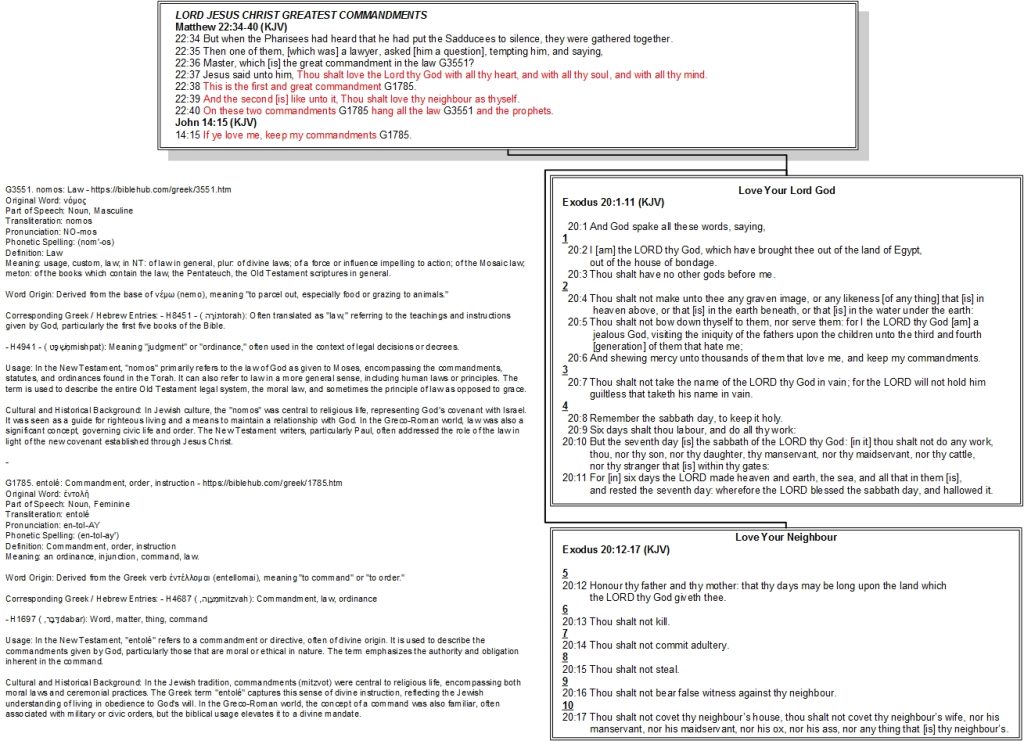Greatest Commandments.
Matthew 5:17-20; 19:17; John 14:15; Matthew 22:36-40; Luke 10:25-28; Mark 12:28-31; Ecclesiastes 12:13-14;
G3551. nomos: Law - https://biblehub.com/greek/3551.htm
G1785. entolé: Commandment, order, instruction - https://biblehub.com/greek/1785.htm
G4137. pléroó: To fill, to make full, to complete, to fulfill - https://biblehub.com/greek/4137.htm
H4687. mitsvah: Commandment - https://biblehub.com/hebrew/4687.htm
-
Matthew 5:17-20 (NET)
Fulfillment of the Law and Prophets
5:17 “Do not think that I have come to abolish the law G3551 or the prophets. I have not come to abolish these things but to fulfill G4137 them.
5:18 I tell you the truth, until heaven and earth pass away not the smallest letter or stroke of a letter will pass from the law G3551 until everything takes place.
5:19 So anyone who breaks one of the least of these commands and teaches others to do so will be called least in the kingdom of heaven, but whoever obeys them and teaches others to do so will be called great in the kingdom of heaven.
5:20 For I tell you, unless your righteousness goes beyond that of the experts in the law and the Pharisees, you will never enter the kingdom of heaven.
-
Matthew 19:17 (NET)
19:17 He said to him, “Why do you ask me about what is good? There is only one who is good. But if you want to enter into life, keep the commandments G1785.”
-
John 14:15 (NET)
14:15 “If you love me, you will obey my commandments G1785.
-
Matthew 22:36-40 (NET)
22:36 “Teacher, which commandment G1785 in the law G3551 is the greatest?”
22:37 Jesus said to him, “‘Love the Lord your God with all your heart, with all your soul, and with all your mind.’
22:38 This is the first and greatest commandment G1785.
22:39 The second is like it: ‘Love your neighbor as yourself.’
22:40 All the law G3551 and the prophets depend on these two commandments G1785.”
-
Luke 10:25-28 (NET)
The Parable of the Good Samaritan
10:25 Now an expert in religious law stood up to test Jesus, saying, “Teacher, what must I do to inherit eternal life?”
10:26 He said to him, “What is written in the law G3551? How do you understand it?”
10:27 The expert answered, “Love the Lord your God with all your heart, with all your soul, with all your strength, and with all your mind, and love your neighbor as yourself.”
10:28 Jesus said to him, “You have answered correctly; do this, and you will live.”
-
Mark 12:28-31 (NET)
The Greatest Commandment
12:28 Now one of the experts in the law came and heard them debating. When he saw that Jesus answered them well, he asked him, “Which commandment G1785 is the most important of all?”
12:29 Jesus answered, “The most important is: ‘Listen, Israel, the Lord our God, the Lord is one.
12:30 Love the Lord your God with all your heart, with all your soul, with all your mind, and with all your strength.’
12:31 The second is: ‘Love your neighbor as yourself.’ There is no other commandment G1785 greater than these.”
-
Ecclesiastes 12:13-14 (NET)
12:13 Having heard everything, I have reached this conclusion: Fear God and keep his commandments H4687, because this is the whole duty of man.
12:14 For God will evaluate every deed, including every secret thing, whether good or evil.
-
G3551. nomos: Law - https://biblehub.com/greek/3551.htm
Original Word: νόμος
Part of Speech: Noun, Masculine
Transliteration: nomos
Pronunciation: NO-mos
Phonetic Spelling: (nom'-os)
Definition: Law
Meaning: usage, custom, law; in NT: of law in general, plur: of divine laws; of a force or influence impelling to action; of the Mosaic law; meton: of the books which contain the law, the Pentateuch, the Old Testament scriptures in general.
Word Origin: Derived from the base of νέμω (nemo), meaning "to parcel out, especially food or grazing to animals."
Corresponding Greek / Hebrew Entries: - H8451 - תּוֹרָה (torah): Often translated as "law," referring to the teachings and instructions given by God, particularly the first five books of the Bible.
- H4941 - מִשְׁפָּט (mishpat): Meaning "judgment" or "ordinance," often used in the context of legal decisions or decrees.
Usage: In the New Testament, "nomos" primarily refers to the law of God as given to Moses, encompassing the commandments, statutes, and ordinances found in the Torah. It can also refer to law in a more general sense, including human laws or principles. The term is used to describe the entire Old Testament legal system, the moral law, and sometimes the principle of law as opposed to grace.
Cultural and Historical Background: In Jewish culture, the "nomos" was central to religious life, representing God's covenant with Israel. It was seen as a guide for righteous living and a means to maintain a relationship with God. In the Greco-Roman world, law was also a significant concept, governing civic life and order. The New Testament writers, particularly Paul, often addressed the role of the law in light of the new covenant established through Jesus Christ.
-
G1785. entolé: Commandment, order, instruction - https://biblehub.com/greek/1785.htm
Original Word: ἐντολή
Part of Speech: Noun, Feminine
Transliteration: entolé
Pronunciation: en-tol-AY
Phonetic Spelling: (en-tol-ay')
Definition: Commandment, order, instruction
Meaning: an ordinance, injunction, command, law.
Word Origin: Derived from the Greek verb ἐντέλλομαι (entellomai), meaning "to command" or "to order."
Corresponding Greek / Hebrew Entries: - H4687 (מִצְוָה, mitzvah): Commandment, law, ordinance
- H1697 (דָּבָר, dabar): Word, matter, thing, command
Usage: In the New Testament, "entolé" refers to a commandment or directive, often of divine origin. It is used to describe the commandments given by God, particularly those that are moral or ethical in nature. The term emphasizes the authority and obligation inherent in the command.
Cultural and Historical Background: In the Jewish tradition, commandments (mitzvot) were central to religious life, encompassing both moral laws and ceremonial practices. The Greek term "entolé" captures this sense of divine instruction, reflecting the Jewish understanding of living in obedience to God's will. In the Greco-Roman world, the concept of a command was also familiar, often associated with military or civic orders, but the biblical usage elevates it to a divine mandate.
-
G4137. pléroó: To fill, to make full, to complete, to fulfill - https://biblehub.com/greek/4137.htm
Original Word: πληρόω
Part of Speech: Verb
Transliteration: pléroó
Pronunciation: play-ro'-o
Phonetic Spelling: (play-ro'-o)
Definition: To fill, to make full, to complete, to fulfill
Meaning: I fill, fulfill, complete.
Word Origin: From the Greek word πλήρης (plérēs), meaning "full" or "complete."
Corresponding Greek / Hebrew Entries: - H4390 (מָלֵא, male'): To fill, be full
- H7999 (שָׁלַם, shalam): To be complete, to fulfill
Usage: The verb "pléroó" primarily conveys the idea of filling something to its full capacity or bringing something to completion. In the New Testament, it is often used to describe the fulfillment of prophecies, the completion of joy, or the filling of individuals with the Holy Spirit. It can also refer to the fulfillment of the law or commandments, indicating a bringing to full expression or realization.
Cultural and Historical Background: In the Greco-Roman world, the concept of "fullness" was significant in various contexts, including commerce, where a vessel or measure being "full" indicated completeness and sufficiency. In Jewish thought, the fulfillment of the law and the prophets was a central theme, with the coming of the Messiah seen as the ultimate fulfillment of God's promises. The use of "pléroó" in the New Testament reflects this cultural understanding of completion and fulfillment, particularly in relation to God's redemptive plan.
-
H4687. mitsvah: Commandment - https://biblehub.com/hebrew/4687.htm
Original Word: מִצְוָה
Part of Speech: Noun Feminine
Transliteration: mitsvah
Pronunciation: mits-VAH
Phonetic Spelling: (mits-vaw')
Definition: Commandment
Meaning: a command
Word Origin: Derived from the root צָוָה (tsavah), meaning "to command" or "to order."
Corresponding Greek / Hebrew Entries: - G1785 (ἐντολή, entolē): Often translated as "commandment" in the New Testament, reflecting the continuation of the concept of divine commandments in the Christian context.
Usage: The term "mitsvah" refers to a commandment or directive given by God, often found within the context of the Torah. It encompasses both moral and ceremonial laws that were given to the Israelites. The commandments are seen as divine instructions meant to guide the people in their relationship with God and with one another.
Cultural and Historical Background: In ancient Israel, the commandments were central to the covenant relationship between God and His people. They were given to Moses on Mount Sinai and are recorded in the Torah, particularly in the books of Exodus, Leviticus, Numbers, and Deuteronomy. The commandments were not only religious obligations but also served as a legal and ethical framework for the community. Observance of the commandments was a sign of faithfulness and devotion to God.
-

Last Updated on 2025-05-01 by assa
